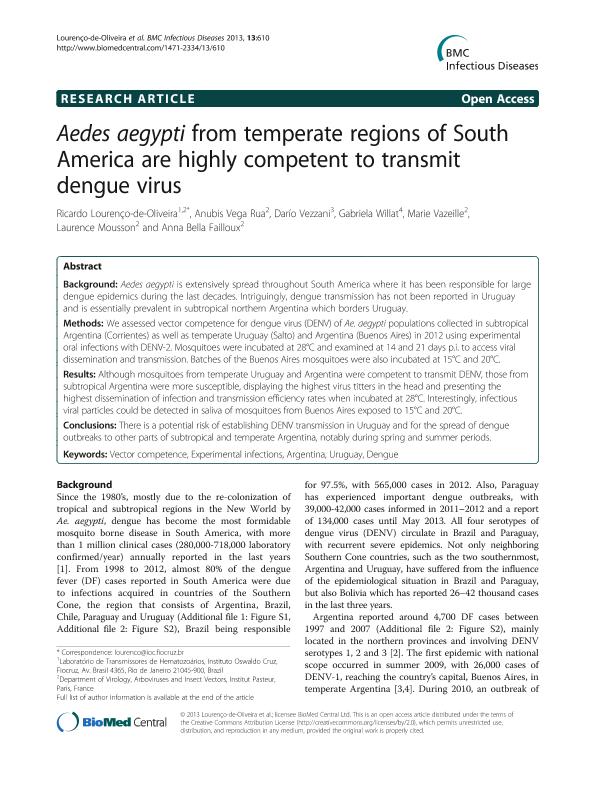Artículo
Aedes aegypti from temperate regions of South America are highly competent to transmit dengue virus
Lourenço de Oliveira; Ricardo; Vega Rua, Anubis; Vezzani, Dario ; Willat, Gabriela; Vazeille, Marie; Mousson, Laurence; Failloux, Anna Bella
; Willat, Gabriela; Vazeille, Marie; Mousson, Laurence; Failloux, Anna Bella
 ; Willat, Gabriela; Vazeille, Marie; Mousson, Laurence; Failloux, Anna Bella
; Willat, Gabriela; Vazeille, Marie; Mousson, Laurence; Failloux, Anna Bella
Fecha de publicación:
12/2013
Editorial:
Biomed Central
Revista:
BMC Infectious Diseases
ISSN:
1471-2334
Idioma:
Inglés
Tipo de recurso:
Artículo publicado
Clasificación temática:
Resumen
Background: Aedes aegypti is extensively spread throughout South America where it has been responsible for large dengue epidemics during the last decades. Intriguingly, dengue transmission has not been reported in Uruguay and is essentially prevalent in subtropical northern Argentina which borders Uruguay. Methods: We assessed vector competence for dengue virus (DENV) of Ae. aegypti populations collected in subtropical Argentina (Corrientes) as well as temperate Uruguay (Salto) and Argentina (Buenos Aires) in 2012 using experimental oral infections with DENV-2. Mosquitoes were incubated at 28°C and examined at 14 and 21 days p.i. to access viral dissemination and transmission. Batches of the Buenos Aires mosquitoes were also incubated at 15°C and 20°C. Results: Although mosquitoes from temperate Uruguay and Argentina were competent to transmit DENV, those from subtropical Argentina were more susceptible, displaying the highest virus titters in the head and presenting the highest dissemination of infection and transmission efficiency rates when incubated at 28°C. Interestingly, infectious viral particles could be detected in saliva of mosquitoes from Buenos Aires exposed to 15°C and 20°C. Conclusions: There is a potential risk of establishing DENV transmission in Uruguay and for the spread of dengue outbreaks to other parts of subtropical and temperate Argentina, notably during spring and summer periods.
Palabras clave:
ARGENTINA
,
DENGUE
,
EXPERIMENTAL INFECTIONS
,
URUGUAY
,
VECTOR COMPETENCE
Archivos asociados
Licencia
Identificadores
Colecciones
Articulos(IEGEBA)
Articulos de INSTITUTO DE ECOLOGIA, GENETICA Y EVOLUCION DE BS. AS
Articulos de INSTITUTO DE ECOLOGIA, GENETICA Y EVOLUCION DE BS. AS
Citación
Lourenço de Oliveira; Ricardo; Vega Rua, Anubis; Vezzani, Dario; Willat, Gabriela; Vazeille, Marie; et al.; Aedes aegypti from temperate regions of South America are highly competent to transmit dengue virus; Biomed Central; BMC Infectious Diseases; 13; 610; 12-2013; 1-8
Compartir
Altmétricas



